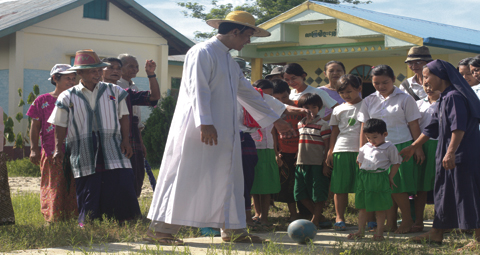April 4 | ![]() 0 COMMENTS
0 COMMENTS ![]() print
print

Faith, hope and love in Myanmar
MISSION MATTERS SCOTLAND brings us two stories relating to those who are living and working amongst the poor in Myanmar
There is so much we take for granted—freedom of speech, freedom of worship, health care, food on the table, an education. How often do we hear children complaining about going to school? The list goes on. But in many parts of the world, where our missionaries dedicate their lives to others, the basics of life are not taken for granted.
Mission Matters Scotland brings us two stories from Myanmar—formerly called Burma—where the daily lives of local people can often be a daily struggle.
For many of us, attending Mass at our local church is a given. For the Faithful in Myanmar, however, it has often been a struggle just to keep their faith alive.
Political turmoil and the repression of religious minorities plagued the country during the second half of the 20th century and, while the situation has improved, much work remains to be done. More than one third of the country’s population lives in poverty, with the average wage being just £1.60 per day. Many of its children, especially those in rural areas, have limited access to basic healthcare and education and, with global warming increasing the frequency of the country’s cyclones and droughts, the years ahead will certainly remain challenging. But one community is proving that the fire in their hearts cannot be extinguished.
The village of Po Kan Bay is located in the Yangon Diocese and is home to 400 people. To address the spiritual, educational and medical needs of this growing community, the Pontifical Societies recently contributed funds for the construction of a church in the village. Named the Holy Family Church, the building has become the hub of the village, helping its people to live their faith on a daily basis, as well as provide education classes and a medical clinic within its walls.
Guiding the community is Fr John Paul, the parish priest. The son of a Buddhist mother who joined the Catholic Faith when she met his Catholic father, Fr John Paul worked with his parishioners to build the Church. Given the location of the village, other work also had to be done so that villagers from other areas could benefit from the new building.
“In the wet season, our village was inaccessible, which is why we had to build a new road,” he explained. “With our own hands and the cement and sand we bought with donations, we were able to develop the community.”
But the vagaries of the tropics were not the only challenge that the villagers faced. The government of this predominately Buddhist nation enforced restrictions on the construction of churches and other Christian buildings, which threatened to scupper the villagers’ hopes. With the changing political climate, along with the harmonious relationship that the villagers enjoyed with their Buddhist neighbours, permission was eventually obtained to build the church.
It took two years to build the church and, since its completion in 2011, its presence has changed the village. While the villagers have always been devoutly Catholic, nonetheless the absence of a place where they could congregate made it difficult for them to foster a greater sense of community. Now, a full Mass is celebrated every Sunday. Not only has this strengthened the bonds within the community, but also the ties that villagers, who have moved elsewhere, maintain with the community.
Moses Mattha, a village elder, illustrates this through his relationship with one of his sons. Unlike his father, who plants mango and banana trees and sends the fruit to Yangon by boat, Moses’ son decided to seek a different life in Singapore. But as someone who contributed to the church’s construction, his life abroad hasn’t weakened his Faith, as his father said: “Young people leave the village to work in the city and other countries, but he still stays strong in faith,” Moses said.
The gradual loss of its youth is just one of the challenges that the community still faces. Apart from limited educational facilities, access to health care is also an issue. Although Fr John Paul is able to provide basic health care to his parishioners, those who have more serious problems must travel to Yangon. And with no living quarters for the priests and seminarians who visit the community, the infrastructure of its spiritual life also needs to be strengthened. But Fr John Paul is confident that, by overcoming these challenges, his parish will continue to grow.
“I am very happy to help the people, spiritually and socially,” he said. “And I believe that, with the Lord’s help, we will grow stronger in his Faith.”
Natural resources can pave a country’s path to prosperity. But there is often a price for such progress. Nowhere is this more obvious than in Myanmar. Sixty years ago, the country’s forests, gems and oil reserves made it one of the wealthiest Southeast Asian nations. Today, it is one of the poorest. Deforestation and pollution have shadowed the activities of mining and petroleum companies, while the country’s long-term political turmoil has damaged the broader economy.
Such a situation has, in turn, brought poverty to over a third of the Burmese population, with many of the most vulnerable being children in rural areas. In villages across the country, education is only provided in primary schools, which makes it difficult for older children in these areas to continue their studies and, therefore, build better lives for themselves. Thanks to the work of Fr Philip Myaing Than and his colleagues, work that has been supported by donations from the Pontifical Mission Societies—the future is looking brighter for these children.
Fr Philip and his colleagues work at St Rita Catholic Church Boarding House, which is located in the town of Maubin, near the capital Yangon. Founded in 1935 as a boarding school, it was later closed by authorities who opposed religious schools, which led to its re-establishment as a students’ boarding house in 1964. Since then, it has provided crucial accommodation to students from ten to 18 years, who need somewhere to live as they complete their last years of primary school or are about to commence high school. Fr Philip sees the house’s role as key to the future success of these children.
“Some children come from villages that are a two-hour flight away, and because of their background they’re unable to afford accommodation elsewhere that would allow them to continue their education. This house helps them to achieve a better future,” he explained.
Apart from giving them a safe and comfortable place to stay, the house also provides its 90 children with breakfast and dinner, as well as weekly sports exercises, such as volleyball and badminton. Three teachers are also employed to help the children with subjects, such as maths, biology and English. As for their spiritual development, Sisters from the Francis Xavier order run weekly Catechism classes for the House’s Catholic children. One of the children who has benefited from these activities is 14 year old Sumon Kyaw. Sumon is from the village of Thabye, where she lived with her parents, five older brothers and three older sisters. Due to financial difficulties, her parents were unable to pay for the tuition she needed, which is why she was brought to the House. Since her arrival, she has not only developed academically, but has also broadened her interests in singing and dancing. Her greatest interest, as she points out, is in serving the Lord as a nun.
“I want to become a sister,” she said. “I want to be near God. I also want to help people. If I am near God I can help others. If someone is sick I can pray, and other people can pray for them.”
Sumon isn’t the only child whose life has changed at the house. Ten years ago, Wai Yan Hted didn’t know whether he would be able to complete his education, as his mother’s death and the poverty he and his four siblings lived in had drawn their future into question. Today, as a 14 year old, he’s developed his artistic ability at school, as well as his proficiency in English, which is his favourite subject. However, when questioned, it’s clear his heart is set on becoming an engineer.
“I want to become a mechanical engineer so that I can fix things that people need,” he said. “And if I become a mechanic, I’ll be able to earn more so that I can study in Singapore.”
Wai’s hopes for the future have not eclipsed his concern for his family. He writes regularly to his father who still works on the farm where Wai spent his childhood. Although his village has a school, the muddy roads can make it difficult for children to travel to and from their classes. Wai knows that such challenges can make it even more difficult for children to achieve the opportunities that he now enjoys, which is why he wants to help them.
“If I earn more, I’ll be able to support the people in my village, especially the school and this boarding house,” he said.
With more support, the staff at St Rita Catholic Church Boarding House know they will be able to give more and more children like Wai and Sumon the opportunity to enjoy a better life.
n Mission Matters Scotland is the working name of MISSIO Scotland. It is the only organisation to guarantee support for every one of the 1100 mission dioceses in the world. To support Mission Matters Scotland call: 01236 449774 or e-mail: [email protected]
n www.missionmattersscotland.org











